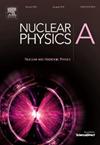The IBM description of the b(E2) anomaly: Dynamical triaxiality and configuration mixing
IF 2.5
4区 物理与天体物理
Q2 PHYSICS, NUCLEAR
引用次数: 0
Abstract
A theoretical investigation has been carried out to examine the effects of dynamical triaxility and configuration mixing on the anomaly, characterized by and , within the framework of the interacting boson model (IBM). The results indicate that the effective γ deformation may undergo substantial changes with increasing angular momentum in the anomaly system governed by an IBM Hamiltonian involving rotor-like terms. Further calculations reveal that mixing between normal and intruder states may facilitate the emergence of anomaly, thereby providing additional theoretical insights into this unusual phenomenon.
IBM对b(E2)异常的描述:动态三轴性和配置混合
在相互作用玻色子模型(IBM)框架下,研究了动力学三轴性和组态混合对B(E2)异常的影响,其特征为B4/2=B(E2;41+→21+)/B(E2;21+→01+)<;1.0和R4/2=E(41+)/E(21+)≥2.0。结果表明,在包含类转子项的IBM哈密顿量控制的B(E2)异常系统中,有效γ变形可能随着角动量的增加而发生实质性变化。进一步的计算表明,正常状态和入侵状态之间的混合可能促进B(E2)异常的出现,从而为这一不寻常现象提供了额外的理论见解。
本文章由计算机程序翻译,如有差异,请以英文原文为准。
求助全文
约1分钟内获得全文
求助全文
来源期刊

Nuclear Physics A
物理-物理:核物理
CiteScore
3.60
自引率
7.10%
发文量
113
审稿时长
61 days
期刊介绍:
Nuclear Physics A focuses on the domain of nuclear and hadronic physics and includes the following subsections: Nuclear Structure and Dynamics; Intermediate and High Energy Heavy Ion Physics; Hadronic Physics; Electromagnetic and Weak Interactions; Nuclear Astrophysics. The emphasis is on original research papers. A number of carefully selected and reviewed conference proceedings are published as an integral part of the journal.
 求助内容:
求助内容: 应助结果提醒方式:
应助结果提醒方式:


